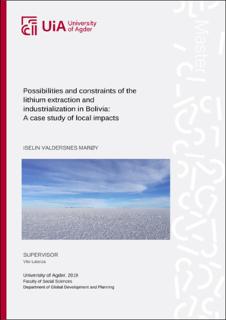| dc.description.abstract | With the pressing issue of an inevitable energy-transition, lithium batteries present itself as part of the solution.Lithium batteries have the ability to harness and store great amount of energy and arethus key for the renewable energies. While lithium can be applied in green technologies, and thus be part of the solution in mitigating emissions, this thesis aims at analyzing local impacts of lithium extraction.Beneath the salt crusts of the world’slargest salt flats, Salar de Uyuniin Bolivia,vastreservesoflithium arefound in brine(high-concentrated salt water). This could potentially represent major economic profitsforBolivia, if they are able to industrialize and turn it into value-added products. A case study was chosen for the research design, as thethesis aim at exploring local perceptions of the project. Communities surrounding Salar de Uyuni was chosen as research sites, and qualitative interviews were conducted with both residents living there, as well as with decisionmakers and experts in La Paz.In the past, Bolivia has been subject to unfair policies leaving multinationals with the profit ofnatural resources while the people have not benefitted much from the extraction. Through nationalizing key natural resources industries,esp. in the oil & gas sector,Evo Morales and the Movimiento al Socialismo(MAS)administration have turned the tide, afteryears of economic control by multinational companies. The lithium sector however has still not been fully developed, hence questions ariseabout whether the sector development in the future will produce substantial benefits for local communities and the national society, and how these might, or might not be outweighed by negative environmental and social effects. The main objective of this thesis is therefore to explore the possibilities and constraints of the lithium project, as well as analyzing therationales driving it.Thefindings suggest there are several challenges for building a successful lithium industry. The environmental impacts of the project are not fully understood, and it remains unclear how itmight affect localcommunities. Lack of transparency makes it challenging to gain information about the project, and the findings depict a lack ofcooperation between the central government and local actors. The lithium project hasgreat potential, but issuesregardingdistribution of revenues have created tensions in the areas surrounding Salar de Uyuni. | en_US |

